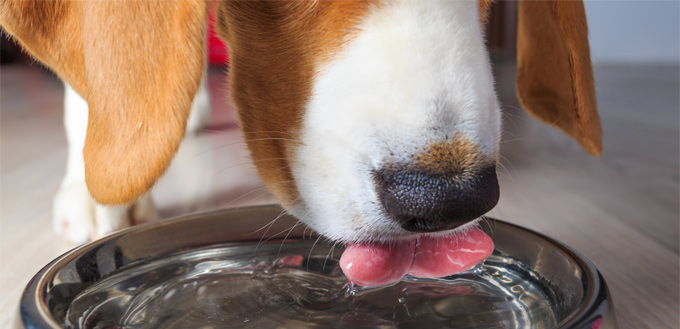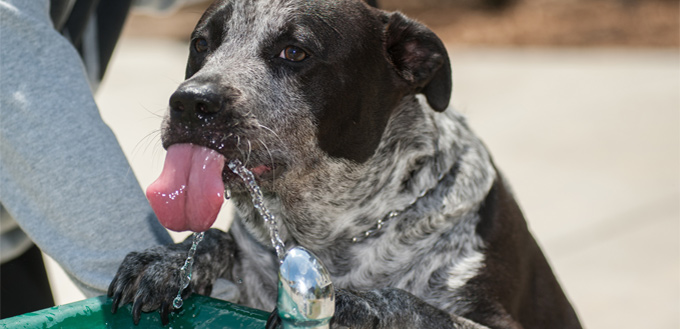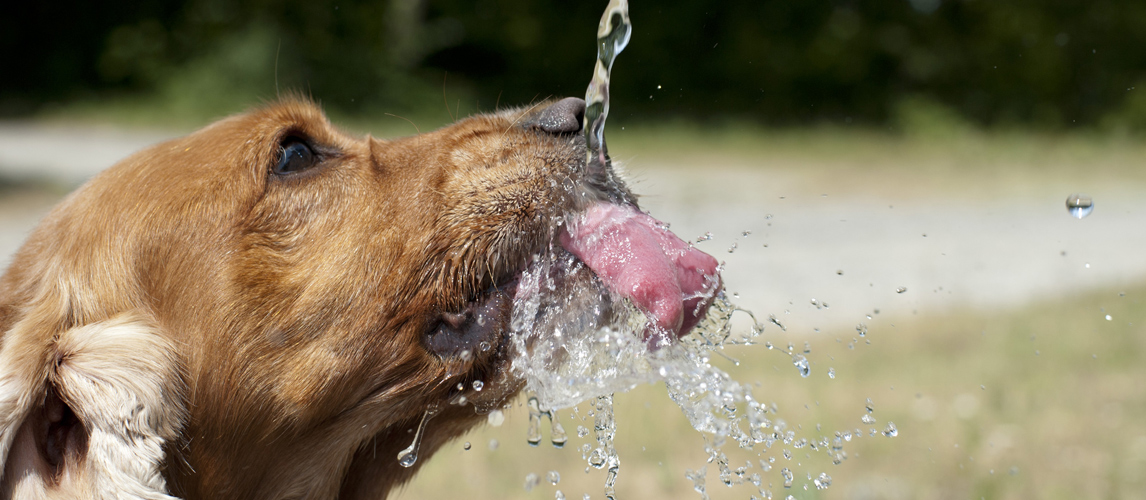A dog that coughs right after drinking water can mean that a contaminant was present in the water that somehow triggered the dog’s cough reflex. Or it could be due to a more serious health problem. Whatever the cause is, a trip to the vet shouldn’t hurt but will give you peace of mind in knowing what could be wrong with your pet.
The Trachea
A canine cough after drinking water is almost always associated with a problem in the dog’s trachea. The trachea is also called the windpipe since it conveys air from the nose and mouth of the dog to the lungs deep in the chest.
The trachea is generally composed of muscles and cartilaginous tissues. The muscles are there to provide the contractile force needed to expel any contaminant that may be swept into the windpipe. The cartilaginous tissues provide a semi-rigid structure for the passage of air from the dog’s throat to the lungs. Without this cartilage, the windpipe may collapse into itself since there will be nothing to keep it upright. The cartilage tissues are arranged into rings, sitting one on top of the other and connected to each other by connective tissues including muscles.

The windpipe shares an opening in the throat with the esophagus, the tube that conveys food to the stomach. The opening comes with a flap known as epiglottis which effectively closes the opening to the trachea as food and water pass down the throat. You can say that the epiglottis is what prevents the entry of water and food or any other substance into the windpipe. If any of this debris or particle finds its way into the trachea, then forceful muscle contractions will be initiated to expel the foreign body. This is a cough.
Any problem with the trachea can, thus, lead to coughing. Among puppies, it is possible that the trachea doesn’t develop properly because of some genetic abnormalities. For example, some dogs like the Yorkshire Terrier are prone to a chronic progressive disease known as tracheal collapse whereby the cartilaginous rings of the trachea slowly lose their structural integrity, causing it to become unusually soft and very weak. Problems in the trachea can also be present among older dogs that may already have substantially weakened tracheal structures because of advancing age.
Let us now take a look at some of the most common issues with the trachea of dogs and how they can potentially trigger the cough mechanism after drinking.
Kennel Cough
One potential reason why dogs cough after drinking is the presence of canine tracheobronchitis or an infection in the dog’s trachea and bronchial tree. Canine Tracheobronchitis is a highly infectious disease that dogs can get from fellow dogs as well as items or surfaces that they are exposed to. It is called kennel cough precisely because it is very common among dogs that live with fellow canines in relatively close quarters such as a kennel or large cage. The main bacterium that causes a kennel cough is Bordetella bronchiseptica while the principal viral agent is Parainfluenza virus, although canine coronavirus may also account for less than 10% of all cases.
The manifestations of kennel cough in dogs are essentially the same with tracheal collapse, although the main symptom is the honking goose type of a cough. If you have a multi-dog household sharing a single dog water fountain, it is often best to purchase a separate pet drinking station for the sick dog. Otherwise, other dogs can also get infected. One can also use individual dog water bottles to help hydrate the sick dog while preventing the spread of the infection to other dogs.
Why do dogs cough after drinking water if they have kennel cough? This has something to do with the resulting inflammation and irritation of the tracheobronchial tree. As the dog drinks and swallows, the passage of water down the esophagus can exert pressure on the already-hypersensitive windpipe in front of it. Normally, as the dog swallows, there is no cough since there is no inflammation. But since there is swelling on the windpipe, gulping water can create pressure on the adjacent windpipe. That being said, you can also expect dogs with tracheobronchitis to cough after eating.

Tracheal Collapse
As we mentioned above, there are dogs that are especially prone to tracheal collapse. Examples of these include toy dogs like Yorkshire Terriers, Chihuahuas, Toy Poodles, Lhasa Apsos, Pugs, and Pomeranians, among others. It should be clear that dogs with this condition are genetically predisposed to it. As puppies, they may not show the clinical manifestations of the disease yet. However, as the dog grows, usually by age 6 to 7 years, the clinical disease becomes more apparent.
In a tracheal collapse or collapsing trachea, the main problem is in the development of the cartilage rings. Remember what we said about this structure providing support for the windpipe? The issue is that the cartilage rings develop as expected. Unfortunately, it tends to lose the integrity of the cartilaginous tissues over time. It becomes extra-soft that it is not able to fully support the structure of the windpipe. Over the course of several years, the diameter of the trachea slowly decreases. This narrowed windpipe makes taking insufficient air extra-difficult for the dog.
So how does this factor into the dog’s cough after drinking? It is quite difficult to ascertain the actual mechanism of the symptom. However, it is believed that a few drops of water eventually enter the windpipe and stimulate the muscles to contract forcefully. Since the trachea is in a weakened state, it may not be completely covered by the epiglottis every time the dog drinks or eats. Food doesn’t normally trigger the cough reflex because it is bigger so it cannot pass through the very small opening on the epiglottis-trachea interface. It’s like having a leaky epiglottis allowing scant amounts of water to enter the dog’s trachea.
Identifying collapsing trachea in dogs can be quite easy as their cough is often described as a honking noise, similar to that of a goose. Additionally, the dog may look as if it is gagging. You may also notice a substantial reduction in the dog’s activity and energy levels or that it now tires very easily.
Hypoplastic Trachea
We know that a collapsing trachea is a genetic disease that will only manifest itself after several years. However, if you have almost the same manifestations such as a goose-honking cough in a young puppy, you are most likely looking at a condition called hypoplastic trachea. Whereas collapsing trachea results in a gradual softening and weakening of the cartilage rings of the dog’s trachea, in the hypoplastic trachea, the cartilage rings do not develop fully. That is why this condition is readily seen in puppies.
Dog breeds that have relatively short muzzles – a term called brachycephalic – are more susceptible to the development of hypoplastic trachea. Pug, English Bulldog, and Boston Terrier puppies will usually snore, breathe heavily, and even snort because of the narrowed airway passage. These manifestations are clearly apparent by the time these brachycephalic puppies reach the age of 5 to 6 months. They also tend to gain weight very rapidly because of the relatively low level of physical activity secondary to insufficient oxygen being supplied to the cells and tissues. In other words, these dogs won’t really last that long playing or exercising as they get tired too easily.
The good news about the hypoplastic trachea is that it is usually mild. In most cases, this is not even diagnosed since most veterinarians will consider it as part and parcel of brachycephalic airway syndrome.
Like dogs with collapsing tracheas, puppies a cough after drinking because of the decreased structural integrity of the trachea. The tracheal cartilage rings are not strong enough to hold the trachea together, causing a relatively small space at the junction of the trachea and the epiglottis.
What You Should Do
If your dog coughs after drinking, it could mean it has any of these possible tracheal conditions. If it is still a puppy, your best bet is a hypoplastic trachea, especially if your puppy has a short muzzle. If your dog happens to live in a kennel together with other dogs or may have interacted with other dogs at the park, the vet clinic, and other close quarters, then there is a likelihood that you’re looking at canine tracheobronchitis or a kennel cough as the main culprit. If you have a toy breed that is already at least 4 years old, there’s a chance that it is affected by collapsing tracheas.

The only way you can be certain about such things is by having a veterinarian see your pet. Collapsing trachea can be medically treated or, if it is severe, the trachea can be surgically strengthened to improve its patency. If the issue is kennel cough, appropriate antibiotics may be given together with supportive treatment. Hypoplastic trachea rarely requires veterinary intervention. But that is up to the vet to decide.
A cough is not a disease, but rather a sign that something is wrong. Knowing the possible causes of coughing right after your dog is done drinking can help you determine the best possible course of action.
Sources:
- Coyne BE, Hypoplasia Of The Trachea In Dogs: 103 Cases, Europe PMC
- Buback JL, Surgical Treatment Of Tracheal Collapse In Dogs: 90 Cases, Europe PMC
- Tracheal Collapse in Dogs, WebMD







